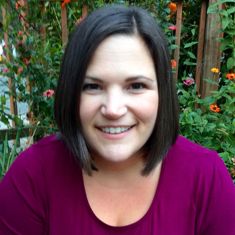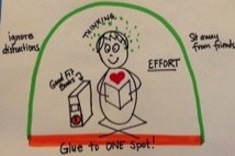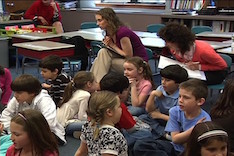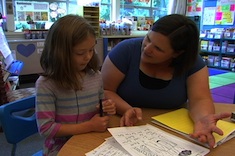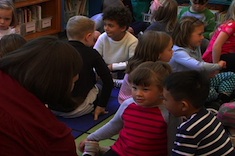The minilesson ended, and 23 first-grade writers launched into their stories—a flurry of paper and possibilities—as one sat paralyzed on his carpet square. Shoulders hunched, face flushed, head resting heavily in one hand, Will refused to look at me. He shoved away the blank papers I had placed next to him. I leaned in to whisper, “Can I help you begin?” and his head retreated into his hoodie, arms wrapped around his knees as little sobs escaped.
My arm reached around his shoulder, and he rolled over to curl into a ball as he said, “I don’t want to write anything.”
It is excruciating to feel stuck in a lousy writing day when inspiration never comes and the well runs dry. For Will this had become a pattern for days on end, and often even when he did walk off to his writing spot to begin, his head went down onto the page as he waited and wished that writing would end. After weeks of offering ways to engage in writing and failing him over and over, I sat down with Will to make a list of what was getting in his way.
I don’t know what to write.
I don’t want to write that kind of writing.
I don’t have any ideas important enough to write.
My writing is too hard to read.
I thought about what I do when the words seem impossible to find, and I grabbed a small journal to offer him. “When writers feel stuck, they stop worrying about which words they are writing or what kind of writing they need to do, and they let whatever is in their head pour out into a puddle of words on the page.”
Will’s eyes brightened a little. “Really? Anything?”
“Yep, anything.”
Within seconds he was off—word after word tumbling onto the page. Twenty minutes later he didn’t want to stop. “I already have six pages—that’s the most I have ever written!” At the end of the week he was on page 52. It was a victory—for this week he was writing. Now, how to sustain it?
I have no idea why it took me weeks to figure out that I needed to drop the genre to get out of this writer’s way. My teaching was making him miserable! And frankly, it was making me a grump too. We had been moving from genre to genre all spring as I dutifully followed the calendar of the new workshop curriculum we were using. I was reading and assessing student writing regularly and too often entering conferences and small groups with my own agenda of what was next for these writers. It was sucking the joy right out of the room.
So when I saw Ralph Fletcher’s Joy Write, my hands could not grab it fast enough. Ralph writes the following:
“In this book I’m proposing a new concept: greenbelt writing. Writing that is raw, unmanicured, uncurated. I’m talking about informal writing. Writing that is wild, like the pungent skunk cabbage that sprouts haphazardly along the edge of a swamp. I’m talking about low-stakes writing, the kind of comfortable composing kids do when they know there’s no one looking over their shoulder.”
I reflected on our year so far and wondered if I had left any space for greenbelt writing. It grew from the joyful inquiry wedged between our formal units of study when writers experimented with genre and purpose and wrote straight from their hearts. It grew through our class inquiry into the habits that increase writing volume and stamina when writers could write on any topic and in any genre they wanted. It grew out of the songs and poems and letters and posters they created after International Women’s Day. It grew when I started a minilesson, saw that 20 kids were already checked out, and said, “Today you are your own writing teacher—write anything, anywhere in the room, with anyone you want to learn from, and report back to let me know how it went!” and writers cheered as they ran from the carpet to get started. It grew when I dropped an expectation of an outcome and instead encouraged agency. Those were the days I enjoyed most too. There was a playfulness I could bring to my teaching and our learning because we had allowed space for it. The trouble was, I wasn’t making enough space for it. It happened when I had time, not because I made time.
Book in hand, I met with my brilliant first-grade colleague and confessed that my writing workshop was in need of an infusion of copious amounts of joy. She was feeling the same tortured drag, trying to bring writers to the lessons in a resource instead of using the resource to inspire great writing. Thank you, Ralph, for the reminder that great writing requires joy—“Writing that is fun, passionate, and joyful, and reflects what matters to each student. This is the best way I know to create writing classrooms where the student can develop the concept: I am a writer.”
Right there, in the middle of the workroom, we agreed to experiment this spring, to end the year with greenbelt writing, not a push to publish a class anthology. To back off of our writers when they write for themselves, and let them explore and play in the process. We thought about the power of asking questions instead of offering strategies—allowing writers the space to discover voice and purpose.
On a nearby sticky note, we planned a rough sequence of units and joyful inquiry for next year:
-
What are the tools that writers use?
-
How do writers build stamina and increase writing volume?
-
How do writers use goals to build independence?
-
What are strong habits that support growing writers?
-
What does my writing voice sound like to the world?
-
Why write?
I saw Will reflected in Ralph’s words:
“Many students find today’s writing workshop too narrow and constricting for them to generate any enthusiasm for writing.”
“Instead of giving reluctant writers more structure, let’s give them more freedom.”
To sustain Will’s engagement I need to protect his freedom. I need to stay out of the way, keep my agenda and strategies to myself, and listen to his. If I want to support his engagement, the goal should be to develop agency and his genuine love of writing, above everything else. When we get stuck again, I want to remember that it is freedom, choice, and joy that will bring writers back to the pleasure of writing. Every time.


